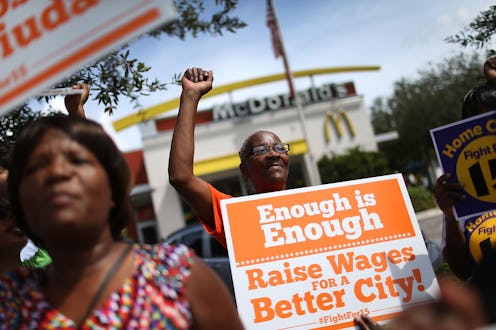News
The Bad News About Seattle's $15 Minimum Wage

Three years ago, Seattle voted to incrementally increase the minimum wage in the city to eventually reach $15 an hour. It was a huge victory for supporters of raising the minimum wage, and a way to test out how other cities could handle a potential wage raise. However, via a report out of the University of Washington this week, Seattle's minimum wage raise is costing workers hours by about 10 percent, and therefore these workers are losing income.
The study (which has not been peer-reviewed), per the Washington Post, found that the cost to low-wage workers outweighed the benefits three to one. The hike, it seems, has cost low-wage workers on average $125 per month. The study looked at the number of hours workers entered in since the mandatory wage hikes.
In 2014, Seattle voted to raise the minimum wage, which was $9.47 at the time. The new law raised wages to $11 in 2015 and then $13 in 2016, eventually raising it to $15 by 2121.
The findings go against previous research that suggested that the benefits of raising minimum wage actually outweigh the cost four to one and even five to one. It also contradicts another recent study on the effects of raising the minimum wage by the University of California, Berkeley, which found that when cities increase the minimum wage up to half or less than half of the area's average wage, the worst effect is a small reduction of employment.
The study concluded that the minimum wage raise boosted overall food service industry by 1 percent and limited-service restaurants by 2.3 percent, according to The Atlantic. This study has also not been peer-reviewed.
However, critics of the University of Washington study suggest that the loss of hours could be contributed to the boom in Seattle's market around the time the minimum wage was raised from $11 to $13 in 2016, and possibly not the wage raise itself. As the Washington Post pointed out, the University of Washington study did not include large employers with locations in and outside of Seattle. This is because the minimum wage hike is not applicable to some large employers or some small businesses.
Whether the same findings would occur at $15 is unknown as of yet. Past research suggests that raising the minimum wage modestly provides more good effects than bad, but there isn't yet enough research as to how employers would adjust for a larger raise in minimum wage.
It may still be too early to tell what the effects of a higher minimum wage on Seattle will be as the minimum continues to increase, but it does give a little insight to a possible negative outcome of the experiment.